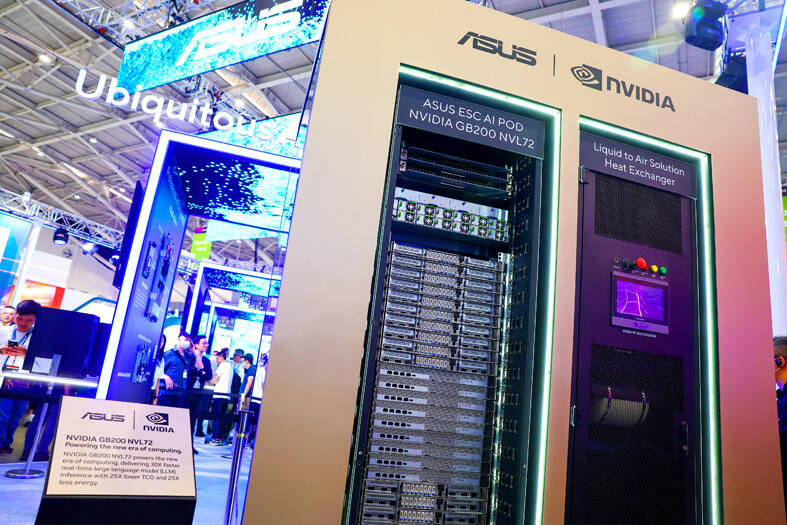Asustek Computer Inc (華碩), the world’s No. 5 PC brand, yesterday posted record quarterly net profit for last quarter, thanks to robust demand for its gaming PCs and computers with artificial intelligence (AI) features, especially from China.
The release of Black Myth: Wukong and Beijing’s economic stimulus package, which included subsidies for electronics purchasing, were the major factors that drove demand for gaming-related gadgets and AI PCs equipped with Microsoft Corp’s new Copilot features, Asustek said.
Asia accounted for 48 percent of the company’s revenue last quarter, followed by Europe at 29 percent and the US at 23 percent, it said.

Photo: CNA
Net profits increased 13 percent year-on-year from NT$11.1 billion (US$345.63 million) in the third quarter last year to NT$12.5 billion last quarter. That represented sequential growth of 6 percent from NT$11.8 billion. Earnings per share rose to NT$16.8 last quarter from NT$14.9 a year earlier and NT$15.9 one quarter earlier.
Looking ahead, Asustek said it expects PC revenue to decline 15 percent quarter-on-quarter this quarter after reaching a historical high of NT$156.74 billion last quarter, as customers became conservative about inventory buildup.
On an annual basis, PC revenue would grow 20 percent, it said.
Components, primarily motherboards, and server revenue are to grow between 5 percent and 10 percent this quarter, or an annual expansion of 30 percent, Asustek said.
“The fourth quarter is likely to be a relatively slower season, rather than a busy season, as it used to be,” Asustek chief financial officer Nick Wu (吳長榮) said yesterday.
Gross margin this quarter is expected to trend downward from 17.1 percent last quarter, given lower revenue contribution from electronic components, Wu said.
Operating profit margin is to slide to 4 or 5 percent from 7.1 percent last quarter, he added.
Overall, Asustek expects to deliver strong performance in revenue this year, Asustek co-CEO Samson Hu (胡書賓) said.
During the first 10 months, revenue swelled 19.5 percent annually to NT$483.1 billion, a company filing with the Taiwan Stock Exchange showed.
Asustek yesterday said it has secured orders for AI servers based on Nvidia Corp’s GB200 chips, with large shipments scheduled in the first quarter of next year, Hu said.
The company primarily shipped AI servers based on Nvidia’s less advanced H100 chips in the first three quarters of the year, Hu said, adding that it would be shipping AI servers with H200 chips this quarter.
Asustek is building in-house server manufacturing capacity to meet requests of cloud service provider customers, while it outsources PC manufacturing to electronic manufacturing service providers, company co-CEO S.Y. Hsu (許先越) said.
The company is building a server production line in the US, aiming to start operations by the end of this year, Hsu said.
Servers, mostly AI servers, are expected to make a greater revenue contribution this quarter, from more than 10 percent last quarter, the company said.

Taiwanese suppliers to Taiwan Semiconductor Manufacturing Co. (TSMC, 台積電) are expected to follow the contract chipmaker’s step to invest in the US, but their relocation may be seven to eight years away, Minister of Economic Affairs J.W. Kuo (郭智輝) said yesterday. When asked by opposition Chinese Nationalist Party (KMT) Legislator Niu Hsu-ting (牛煦庭) in the legislature about growing concerns that TSMC’s huge investments in the US will prompt its suppliers to follow suit, Kuo said based on the chipmaker’s current limited production volume, it is unlikely to lead its supply chain to go there for now. “Unless TSMC completes its planned six

Intel Corp has named Tasha Chuang (莊蓓瑜) to lead Intel Taiwan in a bid to reinforce relations between the company and its Taiwanese partners. The appointment of Chuang as general manager for Intel Taiwan takes effect on Thursday, the firm said in a statement yesterday. Chuang is to lead her team in Taiwan to pursue product development and sales growth in an effort to reinforce the company’s ties with its partners and clients, Intel said. Chuang was previously in charge of managing Intel’s ties with leading Taiwanese PC brand Asustek Computer Inc (華碩), which included helping Asustek strengthen its global businesses, the company

Power supply and electronic components maker Delta Electronics Inc (台達電) yesterday said second-quarter revenue is expected to surpass the first quarter, which rose 30 percent year-on-year to NT$118.92 billion (US$3.71 billion). Revenue this quarter is likely to grow, as US clients have front-loaded orders ahead of US President Donald Trump’s planned tariffs on Taiwanese goods, Delta chairman Ping Cheng (鄭平) said at an earnings conference in Taipei, referring to the 90-day pause in tariff implementation Trump announced on April 9. While situations in the third and fourth quarters remain unclear, “We will not halt our long-term deployments and do not plan to

The New Taiwan dollar and Taiwanese stocks surged on signs that trade tensions between the world’s top two economies might start easing and as US tech earnings boosted the outlook of the nation’s semiconductor exports. The NT dollar strengthened as much as 3.8 percent versus the US dollar to 30.815, the biggest intraday gain since January 2011, closing at NT$31.064. The benchmark TAIEX jumped 2.73 percent to outperform the region’s equity gauges. Outlook for global trade improved after China said it is assessing possible trade talks with the US, providing a boost for the nation’s currency and shares. As the NT dollar